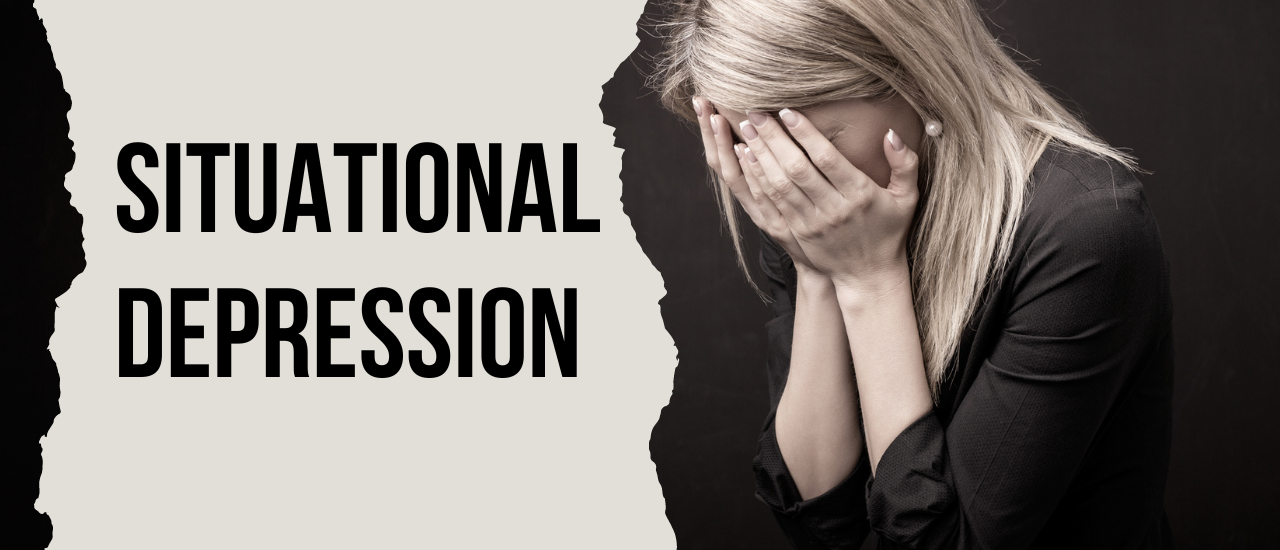

wordpress-seo domain was triggered too early. This is usually an indicator for some code in the plugin or theme running too early. Translations should be loaded at the init action or later. Please see Debugging in WordPress for more information. (This message was added in version 6.7.0.) in /home/sehatnagar.com/public_html/wp-includes/functions.php on line 6114
Short-term, stress-related depression is known as situational depression. It may manifest after you go through a traumatic event or sequence of events. Situational depression is when a traumatic incident starts a depressive episode. Adjustment disorder includes situational depression as a subtype. After a stressful experience, it may be difficult for you to return to your regular routine.

Situational depression symptoms differ from person to person. Stressful life experiences may feel more intense due to situational depression. Your regular life may be severely disrupted by this stress. The following are typical signs of situational depression:
Knowing what’s causing your sadness might also help you figure out the best solutions to lift your spirits and feel better. Situational depression can be brought on by a variety of stressors, such as divorce, death, severe illnesses or injuries, losing a job, a significant change in one’s financial condition, and other significant life changes, including retirement. However, depending on the individual, triggers might differ substantially. Events or pressures that could set off one individual may not have much of an impact on another, and the opposite is also true. Situational depression happens when a person’s capacity for coping with stress is exceeded by the stress of a specific occurrence. That means that, even if they wouldn’t be stressful for other individuals in the same situation, events like marriage or the arrival of a new child in the family could be triggers for some people.
There are some variables that can affect how well a person handles stressors; these variables can either raise or lower the risk of situational depression. Among the elements that raise the hazards are:
Situational depression is widespread and can affect anyone up to 30% of teenagers and 10% of adults report experiencing it at some point. Both men and women are equally affected. Stress is the most frequent factor in situational depression.
Situational depression has a number of subcategories, including adjustment disorder with:
When you’re depressed, you’re typically in a foul mood, cry a lot, feel hopeless, and lose interest in activities you used to enjoy.
This condition is characterized primarily by feelings of anxiety, worry, and nervousness as well as jitteriness, overwhelm, and difficulty concentrating; children with adjustment disorder who have this subtype frequently experience separation anxiety linked to a fear of losing something when they are separated from their parents or other loved ones.
While depression is a persistent state of low mood, low motivation, and low energy, anxiety is a feeling of extreme fear or worry. Though they can both occur separately, anxiety and depression are frequently experienced simultaneously. Both excessive worry and depression can be brought on by stressful conditions. Stressful situations can also make you more prone to worry. It is common to experience occasional feelings of emptiness and anxiety, especially during times of stress. However, deep and enduring depressive or anxious feelings can make it difficult for you to enjoy life.
A set of mental health disorders with comparable characteristics is referred to as disruptive behavior disorder (DBD). The American Psychiatric Association (APA) refers to this group of disorders as disruptive, impulse-control, and conduct disorders. These disorders are notable because they all involve violating the rights and desires of other people, leading to serious conflict with authorities and unhealthful social functioning. Conduct, impulse-control, and disruptive disorders impair a person’s capacity to regulate their feelings and activities.
Any disturbances in a person’s mental equilibrium that cause them to feel or act emotionally are referred to as emotional disturbances.
A person’s quality of life can be significantly impacted by symptoms of depression that range from relatively moderate, passing episodes of low mood to severe, persistent symptoms. According to the Diagnostic and Statistical Manual of Mental Disorders, there are two main kinds of clinical depression: major depressive disorder and the depressed phase of bipolar disorder. Although the exact causes of depression are not fully known, it is thought that a number of important factors, including genetics and environment, increase a person’s risk of developing the condition.
You can identify harmful or counterproductive thought and behavior patterns with the aid of cognitive behavioral therapy (CBT), a therapeutic strategy. CBT seeks to assist you in recognizing and exploring the ways in which your feelings and thoughts might influence your behavior. Some types of psychotherapy put a strong emphasis on going back in time to understand current emotions. CBT, on the other hand, focuses on current beliefs and thoughts. It highlights the necessity of recognizing, challenging, and altering one’s perspective on a circumstance. CBT strives to change any thought patterns and behavioral patterns that get in the way of a person’s desire to live their life. This entails locating distorted or detrimental views that are influencing behavior.
Family therapy or family counseling is a way to create and keep up strong, effective family ties. The aim is to recognize and deal with family issues. These problems could be behavioral, psychological, or emotional in nature. Family systems theory is the root of many family treatment techniques. This argues that rather than being a collection of individuals who work independently of one another, families act as systems. Benefits of counseling might include, but are not limited to: